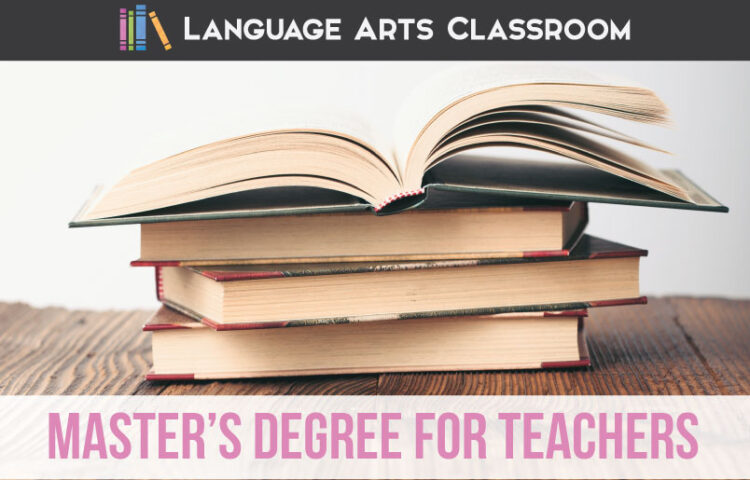What master’s degree should a teacher get?
If you follow me on Instagram, subscribe to my email list, or know me in real life, you know that I just finished my second master’s degree.
I’ve been. . . busy.
And a tad overwhelmed.
Before I get to the background of this messy life situation, a preview:
Below, I discuss all ideas concerning teachers and master’s degrees, from personal goals to implementation of ideas in the secondary classroom. Plenty of people have asked me what master’s degree should a teacher get, and I can provide some guidance on that.
If you’d like to read about my decisions with master’s degrees, my thoughts are below.

Rarely is life straightforward. . .
The Teaching Degree
In 2008, I graduated with a master’s in teaching and leadership. I knew (had known since I was an undergraduate!) that I wanted to be in K-12 leadership. My future included coaching or being a department chair. I figured that eventually, I would be a principal.
I took the classes, did the research, and graduated.
Then, I realized that I would never leave the classroom. I had zero desire to leave students.
Still, this degree benefited me in many ways, more than a simple pay raise. It might sound silly, but I knew that administration was wrong for me because I had such respect for what administrators do. The overwhelm and the demanding balance? Not for me. Many times throughout the COVID shutdown, I thought, “I would be terrible at these decisions.” I’m glad I am not in admin.
Happily, I am settled into teaching language arts.
The English Degree
Twelve years later In 2020, the middle of a pandemic, it occurred to me that a master’s degree in English would benefit me several ways:
- I would get a raise. (I’m being honest!)
- New classes—I could teach dual credit classes, which sounded fun!
- My high school courses would be updated and infused with ideas. Basically, I would be excited with fresh ideas.
And? All of that worked—those three benefits happened!

The Degree Difference
Which master’s degree should a teacher get? People frequently ask me which degree better serves me and what classes I enjoyed more.
Yes, I know which degree is more useful to me, and many of my loyal blog readers probably can guess the answer too.
But my answer doesn’t really matter, for you, does it?
If you are a teacher and looking at a master’s degree, consider this: You’ll spend dozens and hundreds of hours studying content for graduate school. What excites you? On a Saturday morning, you will be researching and highlighting and drafting—what focus will please you the most? What will help you plan for your future? You’ll spend hours away from your family and home; what will make that sacrifice worth it? Where will you be happiest?
Answer those questions—education or content area—and you should have a better idea of what degree to earn.
So, when I consider the question what masters’s degree should a teacher get, I have lots of ideas—ten to be exact.
I broke my ideas into larger chucks: English content, personal goals, and education ideas.
I start with English content.

English content.
If you are reading this and you teach history or science or another content area, plug in your content area to these explanations. With high school teachers, our degrees hold several angles! Education-focused or content-focused?
Here is what I learned from my English degree concerning the content I teach daily.
Enjoy the humanities.
When I went to college at 17, I knew what interested me, loosely. Before I knew the term “humanities,” I knew what I enjoyed in life.
Getting a master’s degree in English brought me personal joy because I love reading, researching, and writing. When I can spread that excitement to young students, my classes become more engaging.
Remember: every bit of it matters.
Some class periods, we would discuss every tiny component of a language arts class: writing, genres, grammar, rhetoric, literature, poetry, literary devices, and on. With a specific content degree, all of the pieces are part of the whole.
And? We English teacher must be fair and properly prepare these future humanities majors. It is unfair to think, “I hate grading speeches” or “Grammar makes no sense.” We have students in our classrooms who need to own a foundation of that material.
It is only fair to our students to present all of our beautiful content.
Don’t oversimplify English content.
After I got to know my professors, I asked questions about content. For instance, the idea that “theme can’t be one word.” Many English teachers have said that to me over the years, but I don’t remember explicit instruction on that from undergraduate classes.
So, I asked. Every PhD professor I had said the same answer: Absolutely, theme can be one word.
Where did this idea come from? Why do K-12 teachers teach that theme is a statement, motif is one word?
I think English teachers took the educational side of their job and applied it to this concept. If we can explain to students that motif and theme are different, then we can move onto more complex concepts and work with stories. We found a way to explain the concept but in the process, we taught something incorrectly.
That’s not fair, though, to oversimplify our content though. Language arts is deep and nuanced. Part of our job is to cover the messy, less clear parts.
(Also in this pile: You can’t start a sentence with “because” and “said is dead.”)
Of course, teachers are humans too. Next, I cover personal considerations in choosing a graduate focus.

Personal Goals.
I graduated with my undergraduate degree in English Ed about twenty years ago. My passion in life centers around stories and language. Naturally, this new master’s degree that I would get for teaching would connect to me personally! Personally, here is what I learned personally from my MA in English.
Stay passionate.
I love literature, grammar, nonfiction—all of my content.
Honestly, I forgot how much I loved language arts until I started this degree. I almost feel like a new teacher again, ready to bring new ideas to my students.
Protect yourself—balance.
Yeah, “work-life balance” is a buzzword right now, but I’m going to chat about it. I work full-time, have three kids, and am married. When I considered what master’s degree should a teacher get, I considered the rest of my life.
Here are two ways I saved time.
In the classroom, my biggest struggle is what every English teacher says—grading papers. For instance, when my professors sent out my schedule, I planned when my students’ papers would be due. I never had a large seminar paper due when my students had research papers due. Thinking ahead, I knew that I would not be able to fairly grade student writing and write my papers well if they overlapped.
In my personal life, I strove for extra organization. My family and I created a master list of my kids’ extracurricular activities and decided who would run whom on what days. We (fortunately) could schedule some music lessons for online, and my kids practiced their instruments from home. I also meal prepped over the summer and winter break so that we had frozen meals to pop in the oven.
And? It was not perfect. One semester, I had an early class and my kids had fast food on those evenings. I missed some band and chorus performances. When those happened, I tried (very imperfectly) to explain to my kids how earning a degree at any age requires sacrifices.
Hopefully, my honesty with students and my kids served as a life lesson.
Explore outside the classroom.
We teachers get stuck in our rooms, or at least, I know I am guilty of doing so. Here is my best example:
I enjoy young adult literature. The topics and books are fun!
But? I do not love young adult literature like some people do. Fantasy and sci-fi overall are not my jam.
Sure, I read ya for teaching and for building relationships with my students. Still, I need to explore outside my classroom. For me, that looks like reading plenty of nonfiction and memoirs, my favorite reads. I’ll be a more passionate teacher when I do so.
Finally, I present educational considerations with earning a master’s degree.

Education Goals.
After becoming a student again and winding through a university, I have new goals that pertain to education concerning my students. Plus, a refresher on being a student never hurts a teacher!
Here are four concepts connected to education that struck me while I earned this master’s degree in English.
Explain the humanities.
When I would mention ideas connected with graduate classes, students asked questions! I loved the discussions.
Overall, I felt that my students did not understand the humanities and the potential for studying the humanities in college. Even my seniors were unsure of the type of job associated with an English degree aside from teaching. As a public school teacher and parent of public school students, STEM teachers are doing incredibly well promoting their fields.
Are English teachers promoting their field of study as well?
Don’t underestimate the power of discussion.
Discussions can be difficult for high school teachers to implement. Students can hurt themselves with their words, and a class can easily get off topic. Plus, teachers overwhelmingly fear being in trouble with administrators and parents.
The best classes, where I learned the most from a story or a theory, took place with lots of discussions. New ideas, other perspectives, more research. Discussion in an English class is powerful.
Be careful of our words and implicit biases.
(Deep breath.) We all own ideas, and none of us are perfect. I told myself that many times throughout graduate school.
Once, a professor explained with genuine concern for the amount of Americans on psychiatric medicines. The comment. . . was not well-received.
Which is fine—college is often meant for dissent. And everyone in graduate school is an adult.
Still, the situation reiterated with me the importance of thinking through my comments.
Explain education.
“Education” is not a clear path. The terms associated with college, for example, can confuse and overwhelm. Consider: major, minor, concentration, focus, associates, bachelors, masters, PHD, MD. Why are some classes three credit hours, and others four, and how many hours do degrees need? What is the distinction between “the college of ___” and “department”? My students asked all of those questions, and I gave impromptu lessons on looking at requirements and finding resources.
For those of us in education, we probably use these terms with ease. Our students, some of which will be in college in a few short months? They don’t.
Overall
If you are considering what master’s degree should a teacher get, I hope my honest ideas from above gave you a starting point and some concepts to consider.

